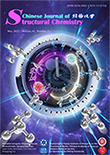
Cover Picture
Versatile Inorganic Oligomer-based Photochromic Spiropyrane Gels
Jiajia Song, Wei Duan, Yun Chen* and Xiangyang Liu*
Versatile Inorganic Oligomer-based Photochromic Spiropyrane Gels
Jiajia Song, Wei Duan, Yun Chen* and Xiangyang Liu*
In this cover picture, a green inorganic oligomer-based spiropyrans composite gelatinous system is constructed based on the calcium ionic nanocrystalline core controlled by capping agent TEA and the flexible cavities in soft materials surrounding the nanocrystalline. This material exhibits excellent cyclic reversible discoloration properties and application potential for hydrazine detection.
Submit a Manuscript
Morphology Engineering toward Highly Emissive Mn2+ Doped PEA2PbBr4 Perovskite with Their LED Application via Phosphonium Passivation
Yu-Feng Sang, Liang-Jin Xu* and Zhong-Ning Chen*
Chin. J. Struct. Chem. 2022, 41, 2205070-2205076 DOI: 10.14102/j.cnki.0254-5861.2022-0088
May 20, 2022
2D perovskite, Mn2+ doped, energy transfer, perovskite LED
ABSTRACT
Mn2+-doped lead
halide perovskites either in 3D or 2D have been extensively explored due to
their rich energy-transfer behaviors. While their application on LED is still
lagging behind in comparison to non-doped 3D perovskite due to inferior
film-formation and low luminescent efficiency. Here we report an in-situ-formed
Mn2+ doped 2D perovskite nanocrystal (NCs) film by introducing quaternary
phosphonium salt during the crystallizing process. The as-formed film shows
improved luminescent efficiency with emission peaked at 600 nm and
photoluminescence quantum yield (PLQY) of as high as 73.37%, which is about 1.3
times higher than that of pristine film. Further characterizations confirm the
enhanced confinement effect from smaller size particle is responsible for the
improved luminescent efficiency. The perovskite LEDs based on pristine and
phosphonium passivated thin films were fabricated, and a great improvement in
the external quantum efficiency of these LEDs (from 0.0017% to 0.12%) is
observed due to the improved morphology and enhanced luminescent efficiency.







